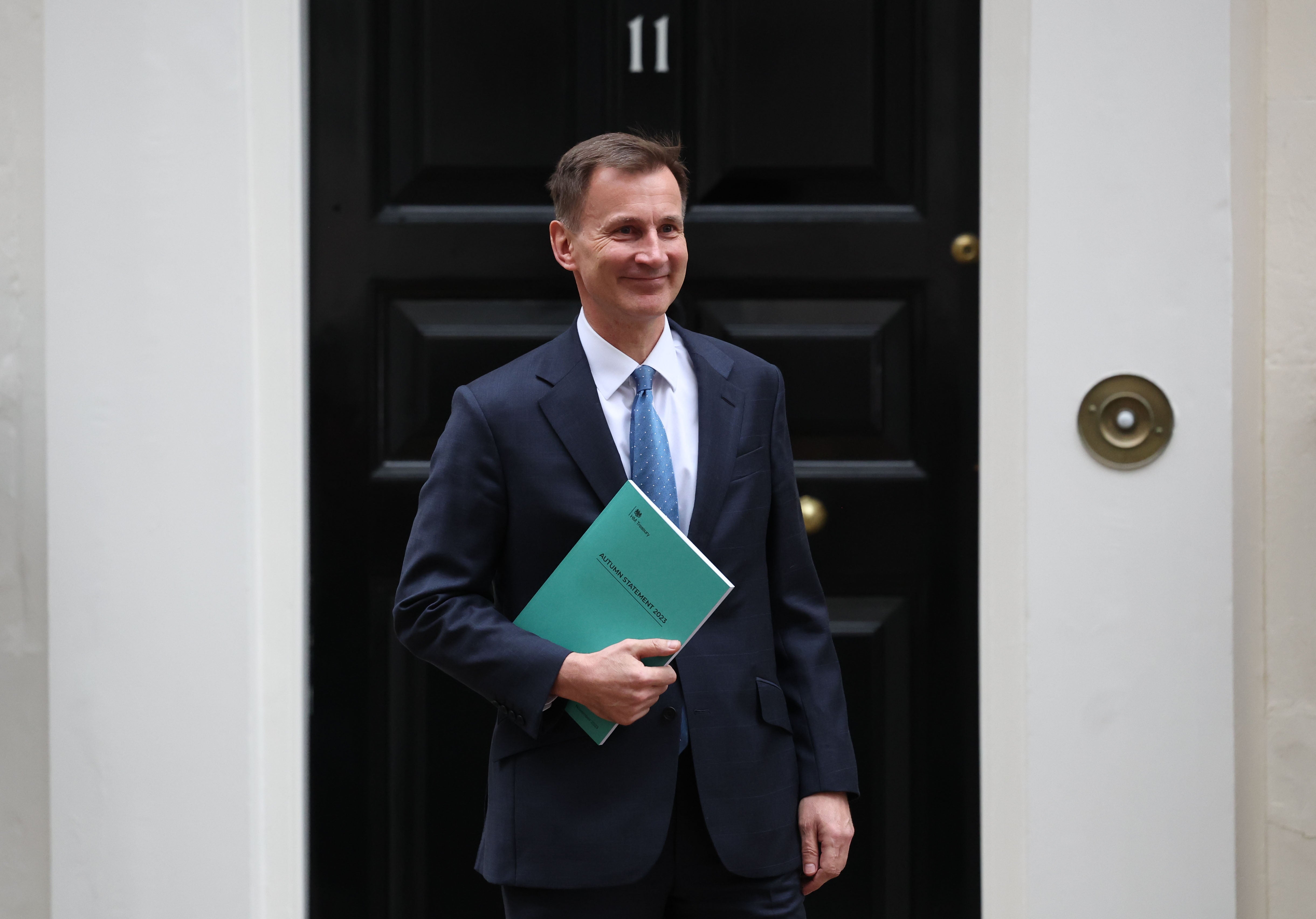The Independent's journalism is supported by our readers. When you purchase through links on our site, we may earn commission.
Hunt’s tax cut charade will not be enough to lead his party to an election victory
The Autumn statement has made some big promises about reducing national insurance, writes Andrew Grice. But voters are unlikely to experience enough of a ‘feel good factor’ for it to make a dent at next year’s general election


After thrashing around for a strategy, Rishi Sunak finally has a credible narrative thanks to the cut in national insurance contributions (NICs) announced by Jeremy Hunt in his autumn statement.
For months, the chancellor told us he could not reduce taxes, but suddenly changed gears at the weekend. He allowed expectations of a 1 per cent cut in employees’ NICs to run, securing days of favourable headlines about tax cuts, but still held back a rabbit for today: the cut will be 2 per cent and will take effect in January rather than next April as expected. Anyone would think it will be an election year.
Now the rate of inflation has halved, Sunak can claim with a straight face that his plan is working. It was noticeable that Hunt repeatedly defended the Tories’ record since 2010, a far cry from Sunak’s criticism of a failed 30-year status quo only last month. Hunt’s approach is more realistic: voters will hardly forget the Tories have been in power for 13 years.
Predictably, Sunak and Hunt have reached for the Thatcher playbook and tax cuts. I suspect a 1p reduction in income tax will follow in the Budget next March. But I don’t think even that will save them at next year’s election. Voters rarely say thank you to politicians and are in no mood to do so amid a cost of living crisis that they rightly think is far from over. Almost three in five Britons (59 per cent) blame the government for high inflation, but less than a third (31 per cent) think the prime minister should get the credit for halving it, according to More in Common.
The same will apply to tax cuts worth about £10bn so far. They will not come close to compensating for the stealth tax – the six-year freeze in thresholds and allowances, raising a whopping £52bn a year by 2027-28. This was due to raise just £8.2bn annually but was extended by two years and the Treasury reaped the rewards of higher inflation and wages.
It’s the biggest tax rise in history but the public have barely noticed, even though it’s the equivalent of raising the basic and higher rates of income tax by 6p. People would certainly have noticed that. The overall tax burden is going up, not down.
Crucially, the autumn statement and Budget will not create the “feelgood factor” the Tories desperately need to avoid defeat next year. Two-thirds of the “pain” from higher mortgage payments as fixed-rate deals come to an end is yet to be felt. And the tax cuts will make it less likely the Bank of England will reduce interest rates from their current 5.25 per cent before an autumn election, as ministers privately hope.
Hunt trumpeted his “110 growth measures” but somehow forgot to mention the Office for Budget Responsibility had downgraded its growth forecast in the election year from 1.8 per cent to 0.7 per cent (the Bank of England predicts a nice round figure: zero).
People are certainly not going to feel good about public services. The suggestion that Treasury coffers have been swollen by inflation is an illusion: public services are not exempt from higher prices and wages. As the health, education, defence and overseas aid budgets are protected, the spending power of other departments is set to be cut by 16 per cent between 2022-23 and 2027-28 – similar to the austerity under David Cameron and George Osborne in the early 2010s – according to the Resolution Foundation. The next government, whether Labour or Tory, will struggle to implement such a squeeze.
While the public wants to see tax cuts rather than tax rises, they favour spending more on public services over reducing taxes by a nine-point margin. Swing voters in the Tories’ two target areas, the red wall in the north and Midlands and blue wall in the south, are more likely than average to prioritise increases in spending over tax cuts, More in Common’s focus groups found. But voters will support Hunt’s decision to force the jobless to make more effort to find work or lose their benefits.
History suggests Thatcher’s tax-cutting manual works only if the Tories’ can run a “hold on to nurse for something worse” campaign and warn voters: “don’t let Labour wreck” an improving economy. Labour was unelectable in Thatcher’s 11 years in power. The Tory chancellor Norman Lamont cut taxes before the 1992 election (only to raise them afterwards, in a likely parallel with today) but Labour was committed to tax rises – unlike today. A growing economy and Kenneth Clarke’s pre-election tax cuts did not save John Major from a crushing defeat in 1997 by Tony Blair, who did not promise tax rises – just like Keir Starmer today.
Ominously for Sunak, today people associate lower taxes with Labour rather than the Tories, who have a lot of ground to make up but little time to do it.
While Sunak and Hunt worked on the autumn statement in Downing Street, their children loved playing charades together. I don’t think voters will enjoy the tax charade their dads cooked up.






Join our commenting forum
Join thought-provoking conversations, follow other Independent readers and see their replies
Comments